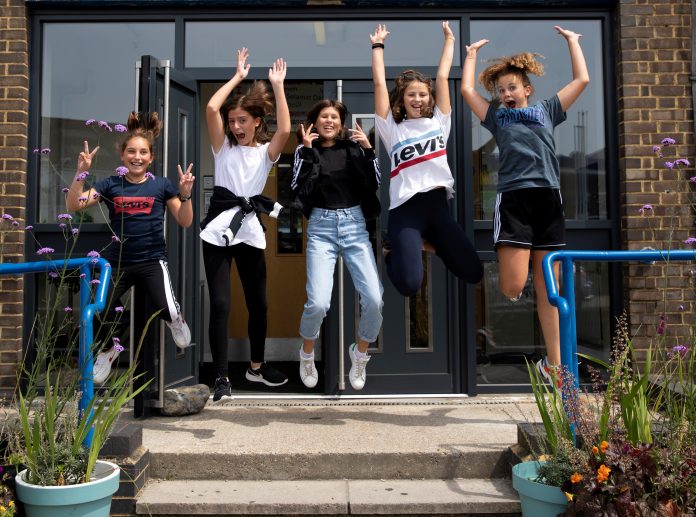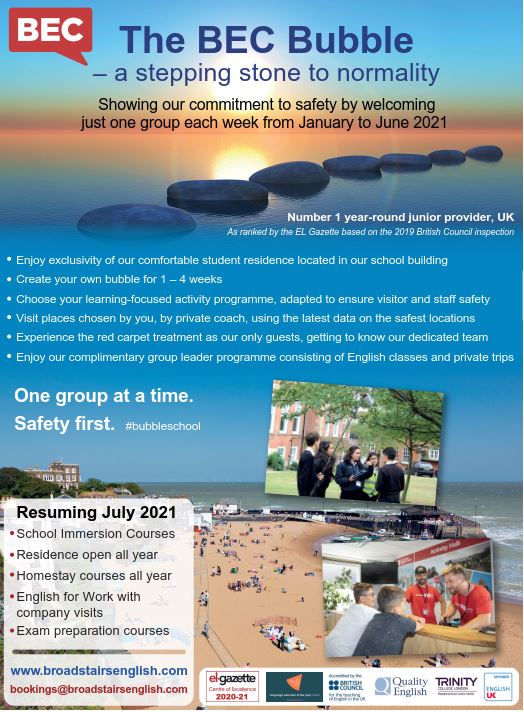How can you run language courses safely in the time of Covid-19? One school may have found the answer as Melanie Butler reports
As educational systems around the world slowly open up, one UK language school is tracking their progress carefully, looking for the best way to offer a secure environment for school groups to come when the centre reopens in January. The answer – now familiar to educators around the world – is to create a protective bubble around the children by keeping them within one social group.
“It’s a stepping stone towards post-Covid normality,” says Chris McDermott of Broadstairs English Centre (BEC), the top- ranking, year-round young learners’ school in both our overall ranking (see page 19) and our list of the top private sector performers for this age group (see page 23).
Now we all know how you create a primary school bubble: simply isolate a class or a year group so they can’t mix with other children in school. But how do you create a “language school bubble?”
Simple – you only allow one school group in your centre in any one week. You recruit from one school. You make sure they all travel together. You go out of your way to keep the bubble together: “We will send a Covid-secure bus as far as Italy to collect them if the students are nervous of flying,” Chris promises.
And you turn your language school into a bubble, too. The BEC bubble will not only offer a deep-cleaned, Covid-secure building, but a small group of dedicated staff, all signed up to the King’s College London Symptom Study system, which logs the health of every staff member every day and, within 24 hours, arranges a test for anyone who shows a single Covid-related symptom.
“The students learn together, eat together, do activities and excursions in the same social group.”
A bubble school only works if you keep the bubble intact. The students learn together, eat together, do activities and excursions in the same social group. At BEC they can all sleep in the same place, “I don’t think we could have devised this programme if we didn’t have an on-site residence,” says Chris.
The final stepping-stone is to create a bubble for the group leaders, usually teachers, who accompany the children: a programme of English classes and private excursions are all on the menu for them.
Indeed, the whole programme is a la carte.
Group leaders decide the level of Covid-19 security the school adopts, perhaps fitting it in with the regime run in schools back home. They can decide if students should wear masks (currently compulsory in schools in France and Italy but not Germany). They can set the minimum social distance in class (currently 1 metre in Germany but 1.5 metres in Spain). “It’s one of the advantages of having a large school building: when you restrict your numbers to 60 or 70 students at a time, social distancing is easier.”
It will be up to groups to decide how much risk they feel comfortable in taking. Take excursions. If they are nervous of visiting big cities, they can switch the London trip and explore the delights of Kent. BEC will check the latest Covid-19 risk level for every destination.
It’s the same with activities. Since the bubble school takes one group from one place at one time, students cannot mix with children from different countries. So BEC are devising optional activities that can be done, either online or socially distanced, with British children.
“It’s something we used to do when we first started,” says Chris. “We linked our Spanish children up with Spanish learners at King’s Canterbury – Britain’s most ancient school – for language exchanges. “Since BEC also works closely with local grammar schools there are a range of possibilities.”
This attention to detail is typical of the ‘wrap around’ school, whose unique system of training all its staff – include its host families – to support students’ language learning has led to BEC being the only UK finalist in the Language Provider of the Year category at the PIEoneer awards.
Focussing on learning will be just as important in the bubble. After all, the bubble is a stepping-stone to normality. But when will normality return? BEC is aiming to open fully in summer 2021, but is not relying on it.
“For us, the bubble school is a sustainable model. One group a week and a small team of staff allows us to deliver a safe, learning- focussed programme and make a small profit.” He smiles. “We can keep the bubble going as long as it takes.”







